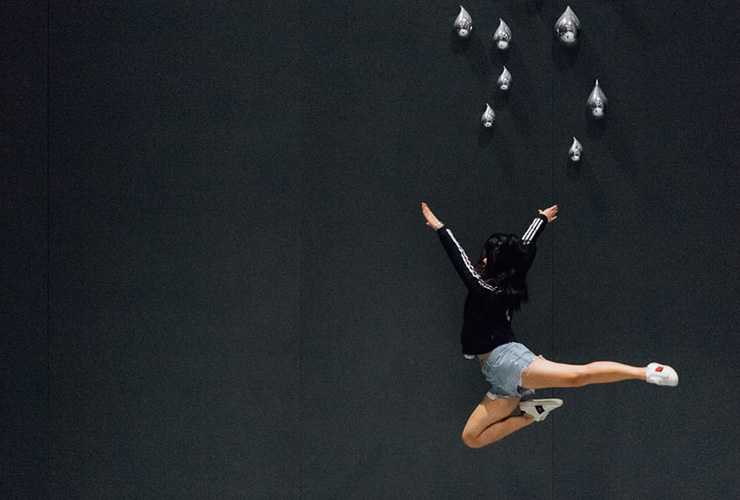
A career coach experiments with an improv game and reflects on how an act of pure play informs living a whole, present, and fulfilling life
—
It’s Sunday morning at the Whitefire Theater, a small community theater in Los Angeles. Three of us are on stage, getting ready to play an improv game called Half Life. With this game, we have one minute to create a scene and then thirty seconds to re-play it, condensed. The process repeats in fifteen, seven, three, and one-second increments. For the seven-second version, we are to perform the scene in backwards order.
Someone from the audience suggests an activity for us: “gardening!” My classmate Jonathan, a tall husky guy, drops to his knees and begins digging a hole in the ground, simulating a shovel hitting the earth. “Honey, you’re going to throw out your back,” I find myself responding, and I ask him what he’s doing. Turns out he’s digging his way to China, and he enthusiastically shouts “ten feet!” “thirty feet!” and “join me!” Before I know it, I’ve jumped into the hole, digging away with my own shovel and calling out the rapidly increasing depth. Roe, our third player, enters the scene, peering inquisitively into our hole. Jonathan asks if she brought the food; she says yes; she jumps into the hole; and our teacher calls time on one minute.
When we condense the scene to thirty and fifteen seconds, the digging becomes frantic and we forget some of our earlier words and motions. By the time we get to the seven, three, and one-second versions — and especially when we play the scene backwards — it’s hilarious chaos: distilled one-liners of “China!” and “food!” while we rush to jump into the hole.
There’s no time to think or be nervous…
It’s an uninhibited, exhilarating experience, an act of pure play, where there’s nothing to do but dig an imaginary hole and experience it and each other.
This moment makes me wonder when I last played, simply for the sake of playing. It can’t possibly be since childhood, right? But maybe that’s true. Looking back, my adolescence and young adulthood were filled with hard work — lots of producing, striving, and accomplishing. Graduating from fancy schools and working prestigious jobs. Of course I’m grateful for the lifelong lessons in discipline, motivation, and standards of excellence.
But I didn’t leave myself much room to play while running on my hamster wheel of long hours, high billing, and proving my worth.
Even moments of fun were fueled by an underlying desire for distraction from the perpetual grind, or my reflex to check off boxes — like more national parks to visit! More shows to see! More yoga classes to try! As if I couldn’t bear to do anything without a goal, or God forbid, be with myself and do absolutely nothing.
The last few years, I’ve been consciously rewiring myself — learning to reconnect with my soul and allowing my mind to serve my heart. I’ve left legal practice and found deep purpose and fulfillment in coaching lawyers and law students. I’m more relaxed and present. I really like who I am and how I’m evolving. But old habits die hard, and it’s still difficult for me to play. When I signed up for improv, I primarily saw it as a new tool for my coaching. Both coaching and improv require deep presence, allow people to co-create, and emphasize saying “yes, and” to whatever happens. The playfulness of improv came as an afterthought. It’s interesting to see how I didn’t sign up for improv just for fun, or solely to experience improv for whatever it turned out to be.
What would it look like to show up consistently with no agenda other than to experience any given moment?
How would a life infused with more play feel? For me, it’s a sense of lightness, openness, creativity, and connection. It’s also the childlike wonder that I’m inviting into my life. How grateful I feel for this game of Half Life, which reminds me there’s nothing to do and nowhere to be in order to be Whole. How remarkable it is to be enough and complete, just by being who we are. The wholeness is all right here and right now, in our mere existence and experience of ourselves and one another.
You may also enjoy reading It’s Time to Fly: Facing our Fears and Letting Go by Kristen Noel